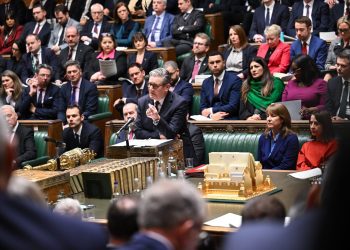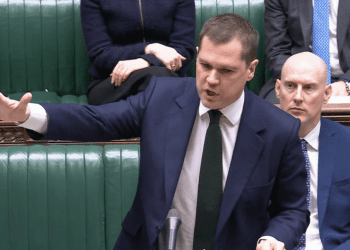Keir Starmer congratulated Canadian prime minister Mark Carney on his historic general election victory in a statement issued this morning.
The UK PM said he looks forward to “strengthening” relations with Canada, and noted Carney’s “personal ties to the UK”.
With this message, Starmer alluded to Carney’s tenure as governor of the Bank of England (2013 to 2020). The Canadian prime minister, who only assumed office in March, also beamed into Labour’s 2023 party conference to issue a personal endorsement of then-shadow chancellor Rachel Reeves.
At the time, speculation that Carney would enter frontline Canadian politics was rife. Today, his latest career move has secured a rare fourth-term victory for the Liberal party.
That is despite anti-Carney forces in Canada tapping Liz Truss, the former UK prime minister and scourge of central bankers everywhere, to campaign on their behalf. Addressing a Canadian audience, Truss argued that Carney’s tenure as BoE governor “created a lot of the problems” that ultimately precipitated her downfall.
Beyond what the result tells us about Truss’ transatlantic activism, the Canadian election is uniquely relevant to the UK’s own political discourse.
There are several possible strands to unpick here.
***This article first appeared in a special edition of Politics.co.uk’s Politics@Lunch newsletter, centring on the Canadian election. Sign-up for free and never miss our daily briefing.***
For one, Pierre Poilievre, leader of the Canadian Conservative Party, established himself as a darling of the UK right in the many months he spent towering over the Liberals in the polls. But Poilievre — whom Robert Jenrick once cited as an inspiration — has now lost his own seat, taking after Truss.
Poilievre’s fortunes declined in 2025 as those of the Liberal party surged. After Justin Trudeau announced his resignation in January, Carney took office as a wave of anti-Trump sentiment swept Canada.
The US president’s enduring threats to Canada’s sovereignty, at once mocking and earnest, have inspired an insurgent defensive nationalism. Carney’s campaign organised itself around this central theme and the corresponding slogan: “Canada Strong”. Poilievre’s messaging never surpassed its initial incoherence.
Donald Trump’s threats to Canada are unique. He has called for the Commonwealth nation to become America’s “51st state”, and repeatedly referred to Carney’s predecessor, Trudeau, as the “governor” of the “Great State of Canada”.
For this reason and others, Keir Starmer’s approach to handling Trump has been almost diametrically at odds with that of Carney. The UK prime minister has prioritised building diplomatic ties, going as far as to extend an invitation for an unprecedented second state visit earlier this year.
But popular disdain for the US president, crucially, extends to Britain. A YouGov survey in March found 78 per cent of Britons have a negative view of Trump. Just 16 per cent have a positive view.
This has not gone unnoticed at Westminster. And it is the Liberal Democrats, the sister party of the Canadian Liberals, who have laid claim to the available anti-Trump territory.
The US president is not, as it stands, an existential threat to the United Kingdom or its status as a sovereign state. But the Lib Dems are counting on the continued salience of anti-Trumpism in Britain. With tariffs still to be implemented, that would seem a reasonable assumption. The stance also befits the Lib Dems’ reputation as a progressive, pro-globalisation, anti-populist party.
It was little surprise then, that the Lib Dems were quick to issue a statement welcoming Carney’s victory overnight. Party leader Ed Davey celebrated the result as a triumph over “Trump’s dangerous populism” and urged voters in the UK to likewise take a stand against “hate-fuelled politics”.
Davey commented: “My warmest congratulations to Mark Carney.
“Voters in Canada have elected a Liberal government on a clear mandate to combat Trump’s dangerous populism. Across the globe, it is liberals who are taking the lead in standing up for prosperity, security and democracy in the face of Trump, Putin and the rest.”
Looking ahead to the local elections, he added: “Voters in England have the chance to send a similar message on Thursday, by electing Liberal Democrat local champions to stand up for their communities against the hate-fuelled politics of Donald Trump and his bootlicker Nigel Farage.”
Mandate acquired and Liberal comeback complete, Carney will continue to pursue his anti-Trump “Canada Strong” agenda in office. If this approach manifests in some international scheme to counter Trumpist protectionism, Starmer will find his position and resolve tested. The PM will hope that his electoral, political and diplomatic imperatives align by 2029.
At the same time, with the Lib Dems set to perform well on Thursday, Davey will double down on his party’s anti-Trump strategy.
Subscribe to Politics@Lunch
Lunchtime briefing
Lunchtime soundbite
‘Any strategy based on either “phasing out” fossil fuels in the short term or limiting consumption is a strategy doomed to fail.’
— Tony Blair calls for a “reset” of action on climate change, suggesting the government should focus less on renewables and more on technological solutions like carbon capture.
Now try this…
‘Carney’s victory owes much to Trump and circumstance’
Canadian PM right candidate for the moment in success shaped more by chance than meticulous planning, the Guardian’s Leyland Cecco reports.
‘Whitehall officials “pushing for the Open to return to Trump-owned Turnberry”’
Via the Guardian.
‘Nigel Farage hopes net zero will help him win over union members’
PM warned Labour will ‘get its head kicked in’ at local elections as Farage’s party rises, PoliticsHome reports. (Paywall)
On this day in 2023:
Raab insists ‘nothing’s off the table’ on finding alternatives to migrant hotels
Subscribe to Politics@Lunch
The post Carney’s comeback suggests viability of Lib Dem ‘resist Trump’ strategy appeared first on Politics.co.uk.
































